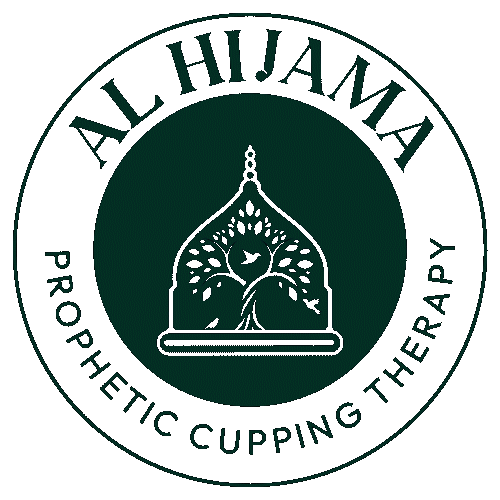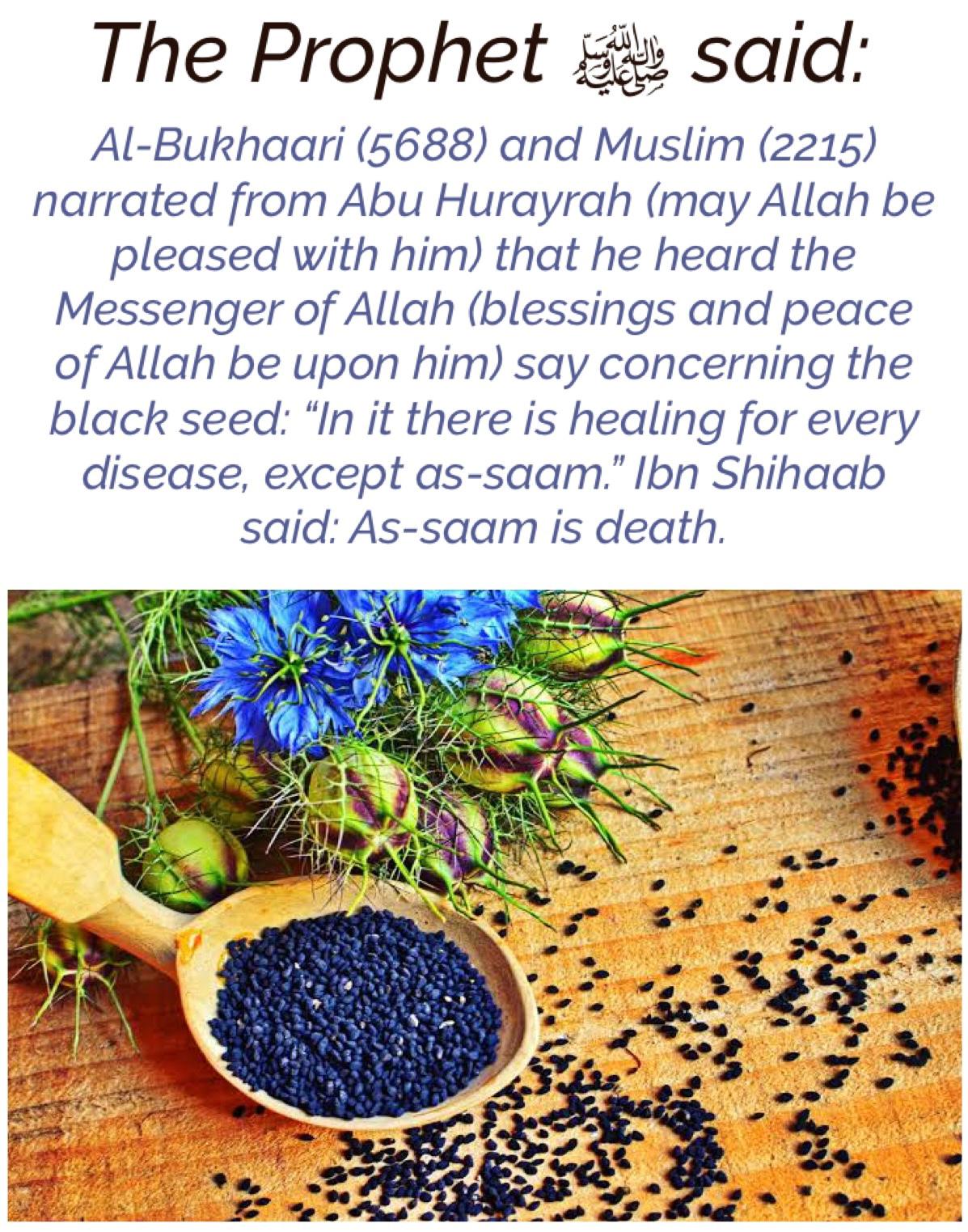....
What is Black Seed Oil?
Black Seed, also known as Kalonji, Black Cumin, Fennel flower and Black Caraway, is derived from a plant found in Eastern Europe and Western Asia called Nigella Sativa. Roman coriander or kalonji, originates from a small flowering shrub that grows in Eastern Europe, the Middle East, and Western Asia. The bioactive seeds of Nigella Sativa are crushed and pressed to produce black seed oil, which has been used as an herbal medicine for thousands of years. Black seed oil, also known as Nigella sativa oil or Habbatul Barakah, is said to have many health benefits. This tiny, jet-black seed is incredibly potent, having been used in traditional medicine for thousands of years due to its wide array of health benefits, including treatment for everything from asthma to diabetes.
Black seed contains the important phytochemical compound Thymoquinone, which is where the power of black seed lies. Black seed is mentioned numerous times in authenticated hadith including the aforementioned Bukhari hadiths.
HADITH
Since the time of the Prophet Muhammad (PBUH) over 1,400 years ago, black seed oil has been revered as a potent natural remedy with deep roots in Islamic history. The Prophet Muhammad (peace be upon him) famously said:
Al-Bukhaari (5688) and Muslim (2215) narrated from Abu Hurayrah (may Allah be pleased with him) that he heard the Messenger of Allah (blessings and peace of Allah be upon him) say concerning the black seed: “In it there is healing for every disease, except as-saam.” Ibn Shihaab said: As-saam is death.
A similar hadith signifying the importance of black seed was narrated by Khalid bin Sa’d:
“We went out and Ghalib bin Abjar was accompanying us. He fell ill on the way and when we arrived at Medina he was still sick. Ibn Abi ‘Atiq came to visit him and said to us, “Treat him with black cumin. Take five or seven seeds and crush them (mix the powder with oil) and drop the resulting mixture into both nostrils, for `Aisha has narrated to me that she heard the Prophet (PBUH) saying, ‘This black cumin is healing for all diseases except As-Sam.’ Aisha said, ‘What is As-Sam?’ He said, ‘Death.”
Hafiz Ibn Hajar (rahimahullah) has cited a narration wherein Nabi (sallallahu ‘alayhi wa sallam) advised someone to take twenty one black seeds, place it into a cloth and soak it overnight in water. The next day, he should put one seed into right nostril and two seeds into the left nostril. The following day, he should put two seeds into the right nostril and one seed into the left nostril and on the third day, one seed in the right nostril and two in the left.
BENEFITS OF BLACK SEED OIL
Black seed oil has been recommended by Islamic scholars and traditional healers as a natural remedy for various health concerns. It offers numerous benefits for health and well-being.
Black seed oil perfectly aligns with these holistic teachings due to its wide range of health benefits. Scientific studies have also validated the traditional use of black seed oil, demonstrating its healing potential. Incorporating black seed oil into your diet offers numerous advantages, including:
- High in antioxidants: Black seed oil is rich in antioxidants, which may prevent or delay certain types of cell damage and boost the immune system.
- Protection against various diseases: It has been shown to offer protection from a wide range of illnesses, supporting overall health.
- Anti-inflammatory properties: Its anti-inflammatory qualities help reduce inflammation and swelling, providing relief from pain.
- Antibacterial characteristics: Black seed oil has natural antibacterial properties, making it effective in fighting infections and harmful bacteria.
5 Respiratory health Black seed oil’s anti-inflammatory and bronchodilatory properties can help with respiratory issues.
6 Digestive health Black seed oil can stimulate digestive enzymes, which can help with digestion and reduce bloating.
7 Skin health Black seed oil may have anti-inflammatory and antibacterial properties that can help with acne and psoriasis.
By adding black seed oil to your daily routine, you not only follow the wisdom of Islamic teachings but also promote a healthier lifestyle backed by scientific evidence.
HOW TO CONSUME BLACK SEED
* In cooking: Black seed can be used as a flavourful spice in your meals, adding a slightly bitter, onion-like flavour to dishes.
* As a supplement: Black seed oil and black seed powder can be consumed in capsule form or loose powder as a dietary supplement.
* In skincare: Black seed oil (pressed from the seeds) can also be used and applied to skin.
* As a tea: The Nigella sativa seeds can be brewed into a delicious tea. Simply steep the seeds in hot water for 10 minutes, strain, and enjoy.
RECiPIES
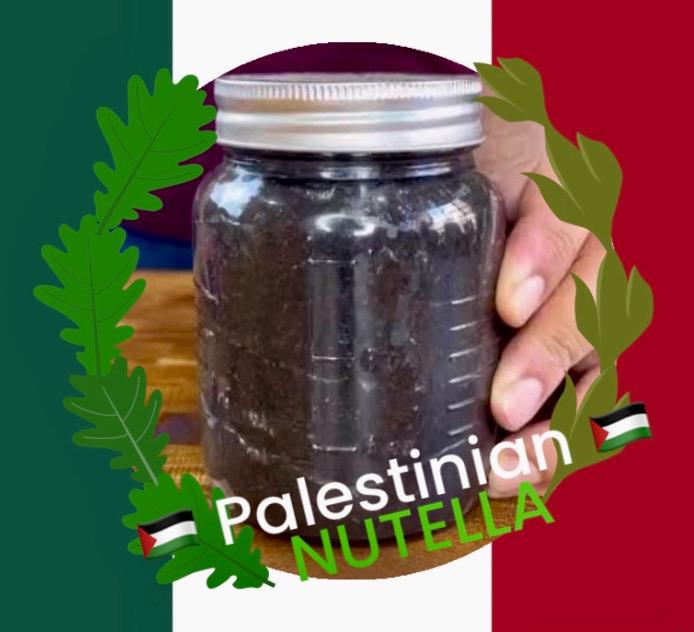
Palestinian Nutella
Ingredients:
1/2 cup Nigella seeds (lightly toasted)
1/2 cup toasted sesame seeds
2-3 tbsp olive oil
2-3 tbsp honey (adjust to taste)
Instructions:
Blend the Nigella and sesame seeds until smooth.
Add olive oil and honey, blending until creamy.
Adjust sweetness if needed, then store in a jar and enjoy!
Serve on toast, make a smoothie, or just grab a spoonful! This spread is as versatile as it is healthy.
What is Black Seed Oil?
Black Seed, also known as Kalonji, Black Cumin, Fennel flower and Black Caraway, is derived from a plant found in Eastern Europe and Western Asia called Nigella Sativa. Roman coriander or kalonji, originates from a small flowering shrub that grows in Eastern Europe, the Middle East, and Western Asia. The bioactive seeds of Nigella Sativa are crushed and pressed to produce black seed oil, which has been used as an herbal medicine for thousands of years. Black seed oil, also known as Nigella sativa oil or Habbatul Barakah, is said to have many health benefits. This tiny, jet-black seed is incredibly potent, having been used in traditional medicine for thousands of years due to its wide array of health benefits, including treatment for everything from asthma to diabetes.
Black seed contains the important phytochemical compound Thymoquinone, which is where the power of black seed lies. Black seed is mentioned numerous times in authenticated hadith including the aforementioned Bukhari hadiths.
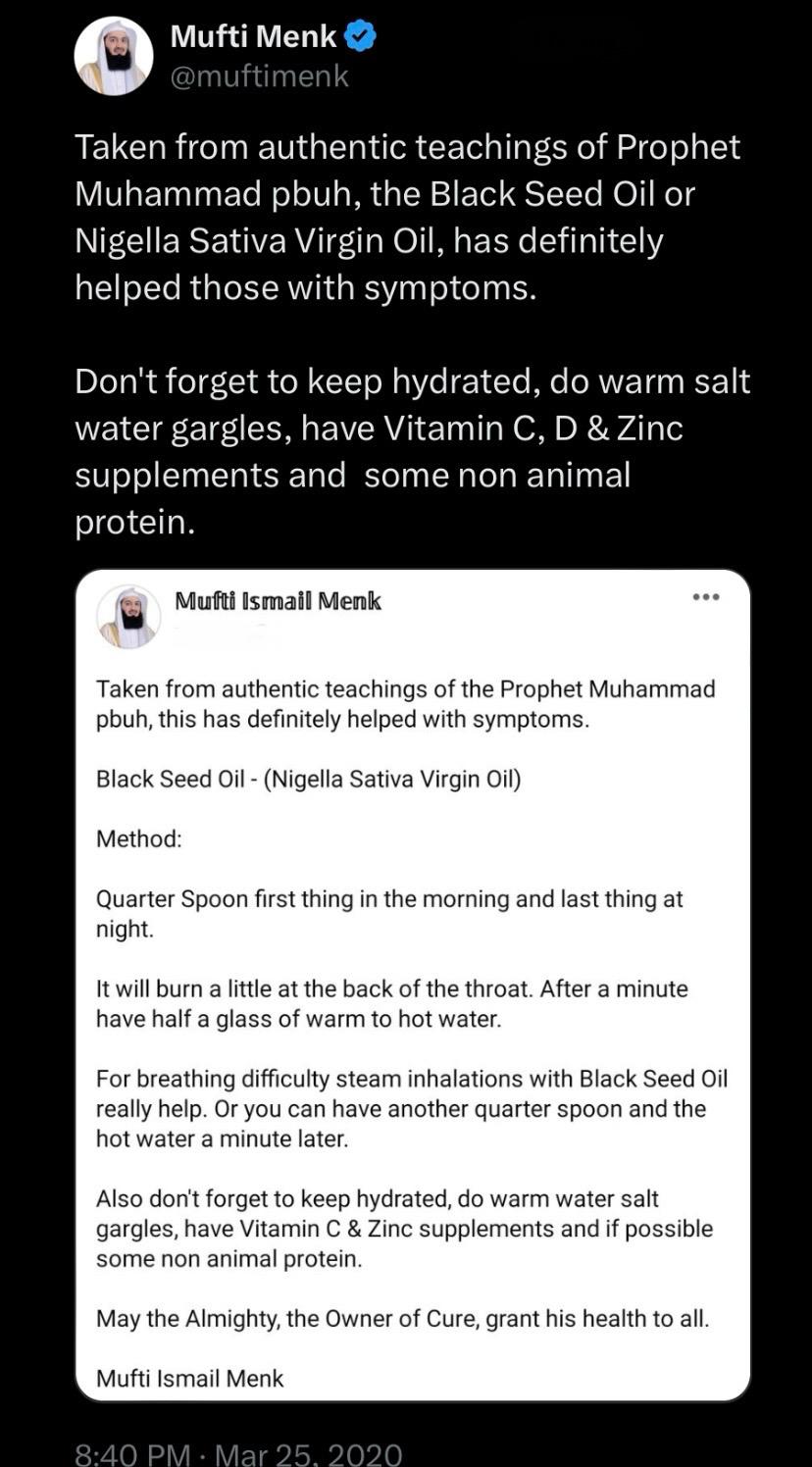
HADITH
Since the time of the Prophet Muhammad (PBUH) over 1,400 years ago, black seed oil has been revered as a potent natural remedy with deep roots in Islamic history. The Prophet Muhammad (peace be upon him) famously said:
Al-Bukhaari (5688) and Muslim (2215) narrated from Abu Hurayrah (may Allah be pleased with him) that he heard the Messenger of Allah (blessings and peace of Allah be upon him) say concerning the black seed: “In it there is healing for every disease, except as-saam.” Ibn Shihaab said: As-saam is death.
A similar hadith signifying the importance of black seed was narrated by Khalid bin Sa’d:
“We went out and Ghalib bin Abjar was accompanying us. He fell ill on the way and when we arrived at Medina he was still sick. Ibn Abi ‘Atiq came to visit him and said to us, “Treat him with black cumin. Take five or seven seeds and crush them (mix the powder with oil) and drop the resulting mixture into both nostrils, for `Aisha has narrated to me that she heard the Prophet (PBUH) saying, ‘This black cumin is healing for all diseases except As-Sam.’ Aisha said, ‘What is As-Sam?’ He said, ‘Death.”
Hafiz Ibn Hajar (Rahimahullah) has cited a narration wherein Nabi (Sallallahu ‘alayhi wa sallam) advised someone to take twenty one black seeds, place it into a cloth and soak it overnight in water. The next day, he should put one seed into right nostril and two seeds into the left nostril. The following day, he should put two seeds into the right nostril and one seed into the left nostril and on the third day, one seed in the right nostril and two in the left.
BENEFITS OF BLACK SEED OIL
Black seed oil has been recommended by Islamic scholars and traditional healers as a natural remedy for various health concerns. It offers numerous benefits for health and well-being.
Black seed oil perfectly aligns with these holistic teachings due to its wide range of health benefits. Scientific studies have also validated the traditional use of black seed oil, demonstrating its healing potential. Incorporating black seed oil into your diet offers numerous advantages, including:
1 High in antioxidants: Black seed oil is rich in antioxidants, which may prevent or delay certain types of cell damage and boost the immune system.
2 Protection against various diseases: It has been shown to offer protection from a wide range of illnesses, supporting overall health.
3 Anti-inflammatory properties: Its anti-inflammatory qualities help reduce inflammation and swelling, providing relief from pain.
4 Antibacterial characteristics: Black seed oil has natural antibacterial properties, making it effective in fighting infections and harmful bacteria.
5 Respiratory health: Black seed oil’s anti-inflammatory and bronchodilatory properties can help with respiratory issues.
6 Digestive health: Black seed oil can stimulate digestive enzymes, which can help with digestion and reduce bloating.
7 Skin health: Black seed oil may have anti-inflammatory and antibacterial properties that can help with acne and psoriasis.
By adding black seed oil to your daily routine, you not only follow the wisdom of Islamic teachings but also promote a healthier lifestyle backed by scientific evidence.
HOW TO CONSUME BLACK SEED
* In cooking: Black seed can be used as a flavourful spice in your meals, adding a slightly bitter, onion-like flavour to dishes.
* As a supplement: Black seed oil and black seed powder can be consumed in capsule form or loose powder as a dietary supplement.
* In skincare: Black seed oil (pressed from the seeds) can also be used and applied to skin.
* As a tea: The Nigella sativa seeds can be brewed into a delicious tea. Simply steep the seeds in hot water for 10 minutes, strain, and enjoy.
RECIPIES

Palestinian Nutella
Ingredients:
1/2 cup Nigella seeds (lightly toasted)
1/2 cup toasted sesame seeds
2-3 tbsp olive oil
2-3 tbsp honey (adjust to taste)
Instructions:
Blend the Nigella and sesame seeds until smooth.
Add olive oil and honey, blending until creamy.
Adjust sweetness if needed, then store in a jar and enjoy! Serve on toast, make a smoothie, or just grab a spoonful! This spread is as versatile as it is healthy.

HONEY
Honey, a natural sweetener cherished for its taste and health benefits throughout the ages, holds a special place in Islamic tradition. Mentioned in the Quran as a source of healing and nourishment, honey is considered a food of great value among Muslims.
The Holy Qur’an (16:69) says, “From its [the bee’s] belly, comes forth a drink of varying colours wherein is a cure for people. Surely there is a sign for those who would give thought.”
HADITHS
The Prophet Muhammad (PBUH) is reported to have said:
“There is a cure in three things: in the incision of the cupper, in drinking honey, and in cauterization with fire, but I forbid my followers to use cauterization.” (Sahih Bukhari)
This hadith highlights honey as a remedy, emphasising its significance in traditional medicine and offering a natural solution for various health issues. As highlighted in the following hadith:
“The property of things having medicinal effects in this world is their honey.” (Sahih Bukhari)
Benefits of Using Honey in Islam
For centuries, honey has been used to treat various conditions, including wounds, sore throats, and digestive problems. Along with its medicinal properties, honey is a natural source of energy and can help boost the immune system.
Honey is considered a Sunnah food, as it was highly valued and recommended by the Prophet Muhammad (PBUH). He often praised honey for its healing properties and regularly included it in his diet. Consuming honey is not only beneficial for health but also a way to follow the teachings of the Prophet Muhammad (PBUH). Honey is not just a sugar, but also a complex combination of enzymes, organic acids, esters, antibiotic agents, trace minerals, and yet unidentified components! One pound of honey contains 1.4 grams of protein, 23 milligrams of calcium, 73 milligrams of phosphorus, 4.1 milligrams of iron, 1 milligram of niacin and 16 milligrams of vitamin C. Honey has been attributed externally with healing wounds and burns, and making the skin supple and smooth. Internally, honey is a cure-all.
1. Natural Alternative to Refined Sugar: Many people are seeking healthier alternatives to refined sugars, which have been linked to various health issues, including obesity, diabetes, and heart disease. Honey, a natural sweetener, is less processed than refined sugars and contains beneficial nutrients such as antioxidants and minerals.
2. Source of Spiritual Nourishment: In Islamic tradition, the use of honey is seen as both a physical remedy and a source of spiritual nourishment. Incorporating honey into your daily life is a simple yet meaningful way to practise the Sunnah and benefit from its numerous advantages. Overall, honey is a valuable and versatile food with numerous benefits in Islam. Whether you’re seeking a natural remedy, a healthier alternative to refined sugars, or spiritual nourishment, honey is an excellent choice. Why not incorporate more honey into your diet and experience its many benefits?
3. Natural Way to Fight Coughs and Colds: Honey contains natural antibacterial and antiviral properties, making it effective in combating infections and promoting healing. In Islamic tradition, honey is frequently used to treat wounds, sore throats, and coughs.
4. Boosts Energy Levels: Honey is a natural source of energy, packed with carbohydrates and natural sugars. Unlike processed sugars that lead to energy crashes, honey provides a steady energy boost. In Islamic tradition, honey is valued for sustaining energy levels and improving focus. Its slow, consistent release of energy makes it a wholesome and nourishing choice for staying energized and alert throughout the day.
5. Supports Gut Health and Digestion: Honey is a natural digestive aid that can stimulate the production of digestive enzymes and enhance the function of the digestive system. In Islamic tradition, honey is often used to treat digestive disorders and promote regular bowel movements. As previously mentioned, the Prophet Muhammad (PBUH) recognised the benefits of honey in promoting wellness.
6. Promotes Healthy and Glowing Skin: Honey’s healing properties extend to skincare, offering a natural solution for a radiant complexion. With its antimicrobial properties, honey can soothe and nourish the skin, promoting healing and reducing inflammation. Its moisturising qualities lock in hydration, leaving skin soft and supple without the need for harsh chemicals. Embracing honey-based skin care products provides a gentle yet effective approach to achieving healthy and glowing skin.
7. Helps with Allergy Relief: In Islamic tradition, honey is revered for its healing properties, including its potential to alleviate allergy symptoms. Consuming local honey is believed to introduce small amounts of pollen into the body, gradually desensitising the immune system to common allergens. This natural approach to allergy relief aligns with holistic wellness principles, offering a gentle alternative to traditional remedies.
8. Aid for Better Sleep: Honey’s benefits extend beyond physical wellness to include mental and emotional well-being. As a natural source of sugars, honey promotes the production of serotonin, the precursor to melatonin, which regulates sleep-wake cycles. Incorporating honey into bedtime rituals can help promote relaxation and improve sleep quality, allowing for a restful and rejuvenating night’s sleep.
RECIPES
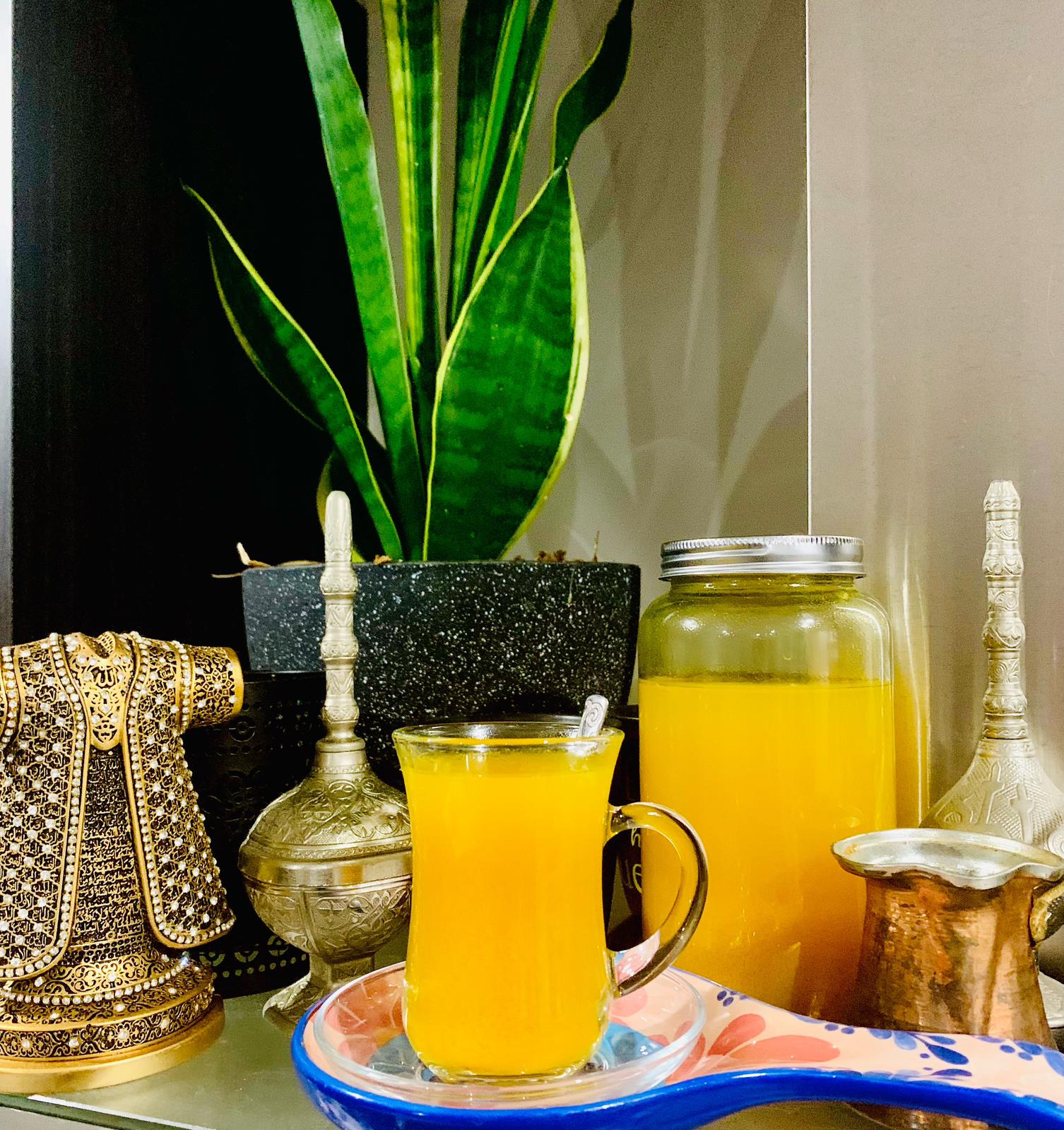
GINGER, TURMERIC & HONEY TONIC
INGREDIENTS
1 sml organic ginger
1 sml organic turmeric
1 tspn oregano
1 tspn cloves
1 tspn aniseed
Touch of black pepper
1/2 lemon
3 tbsp honey
7 cups water
Place water in a small saucepan. Peel ginger and turmeric and slice into little pieces. Add into saucepan. Place oregano, cloves, aniseed and black pepper. Bring to boil and then simmer on low heat for 15 mins.
When ginger has become soft set tonic aside to slightly cool down.
Then strain contents into a jar. Add honey & lemon juice and stir. If required you may add more honey if required. Great for cold, flu or if you are not feeling the best. Add a couple of mint leaves if you like. Refrigerate remaining tonic and heat up on cold days or when not feeling well. Otherwise if you prefer cold its nice and refreshing on summer days.
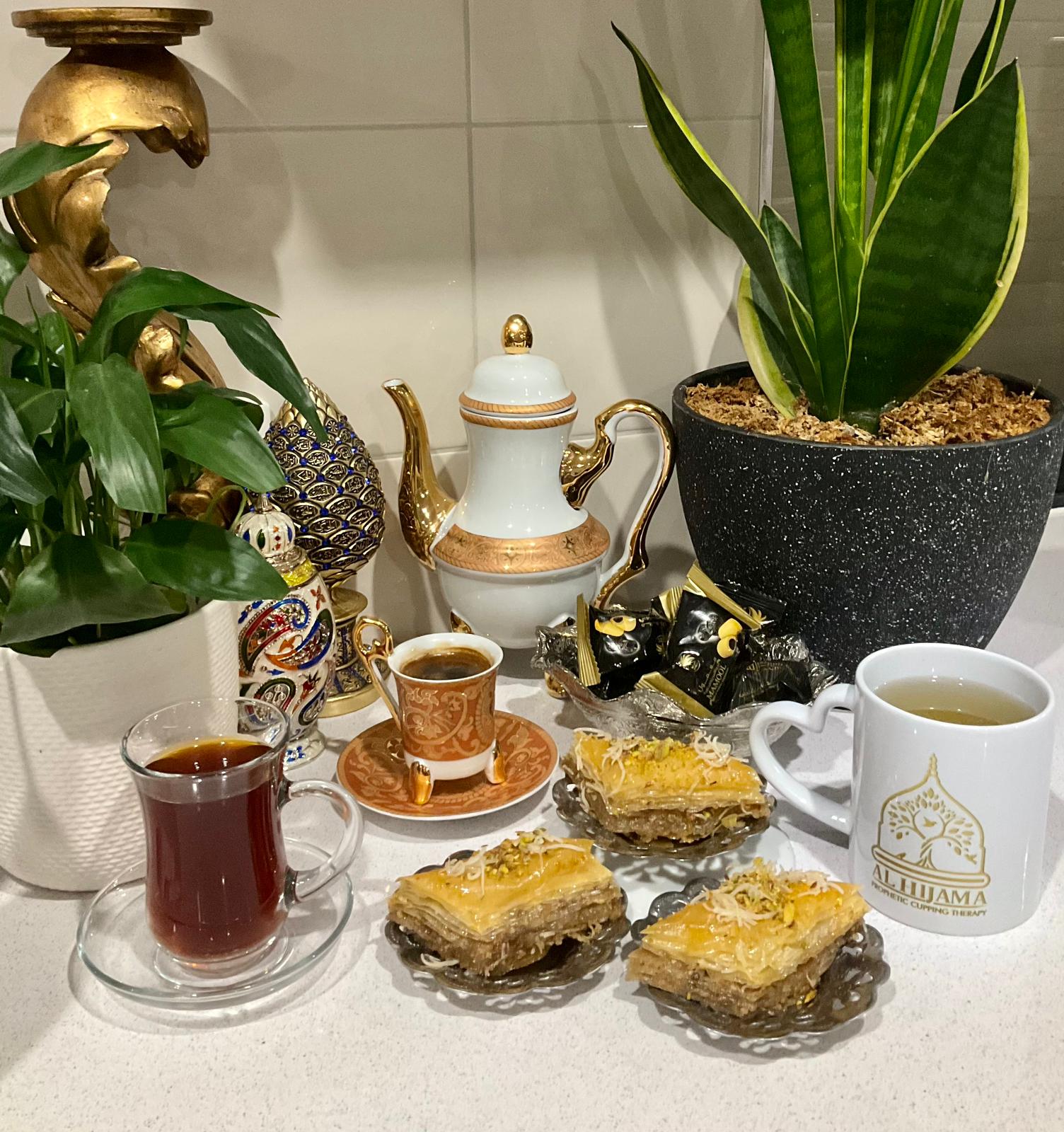
Aisha’s Honey Walnut & Coconut Baklava
INGREDIENTS
Syrup:
* 220g caster sugar
* 150ml honey
* 1 tbsp lemon juice
* 155ml water
Baklava:
* 40 sheets filo pastry (defrosted if frozen)
* 280g butter (salted or unsalted), melted
* 455g walnuts, finely chopped (reduce by 1/4 or 1/2 if preferred)
* 150g desiccated coconut
* 1 tsp ground cinnamon
Instructions
Step 1: Prepare the Syrup
1. In a deep saucepan, combine sugar, honey, lemon juice, and water.
2. Stir over medium-high heat until the sugar dissolves.
3. Reduce heat to medium-low and let it gently boil for 4 minutes without stirring.
4. Remove from heat and set aside to cool completely.
Step 2: Preheat the Oven
* Preheat the oven to 160°C.
* Grease a 22x33cm baking tin.
Step 3: Prepare the Nut Filling
1. Pulse walnuts in a food processor until finely chopped (or to a powder if preferred).
2. Mix walnuts with desiccated coconut and cinnamon.
Step 4: Assemble the Baklava
1. Place one sheet of filo pastry into the tin and brush with melted butter.
2. Repeat with 10 sheets, brushing each layer with butter.
3. Sprinkle 100g of the walnut-coconut mixture evenly over the filo.
4. Add 5 more filo sheets, brushing each with butter.
5. Sprinkle another 100g of nut mixture.
6. Repeat this layering 4 more times.
7. Finish with 10 buttered filo sheets, brushing the top layer with butter.
Step 5: Cut & Bake
1. Using a sharp knife, cut the baklava into diamond or square shapes, ensuring the knife reaches the bottom.
2. Bake for 1 hour 15 minutes, or until golden brown.
Step 6: Add the Syrup
1. Once baked, immediately pour the cooled syrup evenly over the baklava.
2. Let it cool completely at room temperature (preferably overnight) to allow the syrup to fully soak in.
Enjoy your homemade Honey Walnut & Coconut Baklava—sweet, flaky, and delicious!
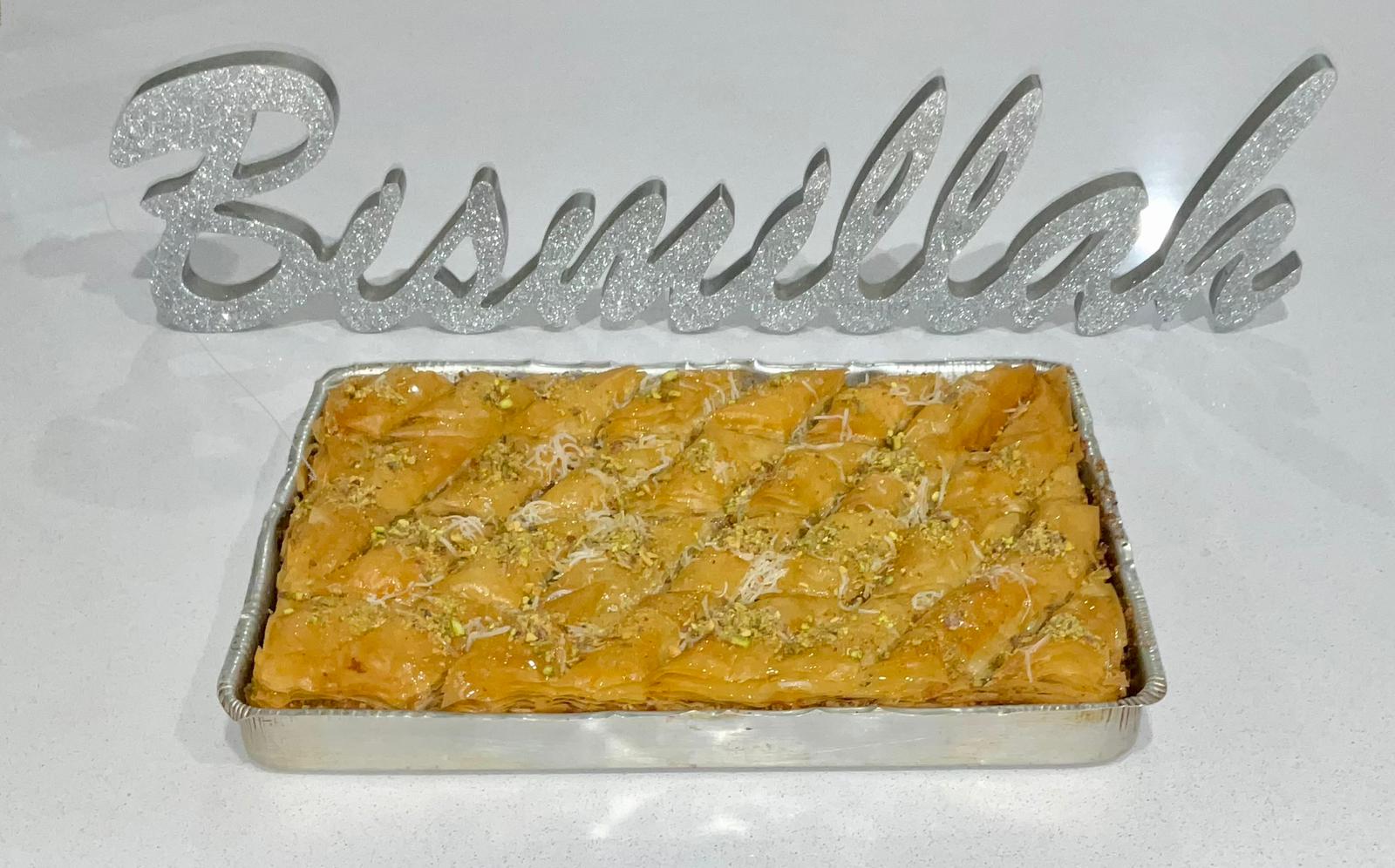
Health Tips
- To relieve a cold and sore throat, mix a teaspoon of honey and the juice of one lemon,in a glass of water and drink every two hours.Another family remedy, which I use frequently,is a clove of crushed garlic, mixed with half a lemon and sweetened with honey. This usually clears up anything I may be “coming down with” by the time Fajr prayer arrives.
- Honey can be used to sweeten items like tea, fresh juices, milk, drinks and cereal. Raw honey – which is thicker and creamier and has a lower GI – can be mixed with cinnamon and used as a spread on toast for suhur.
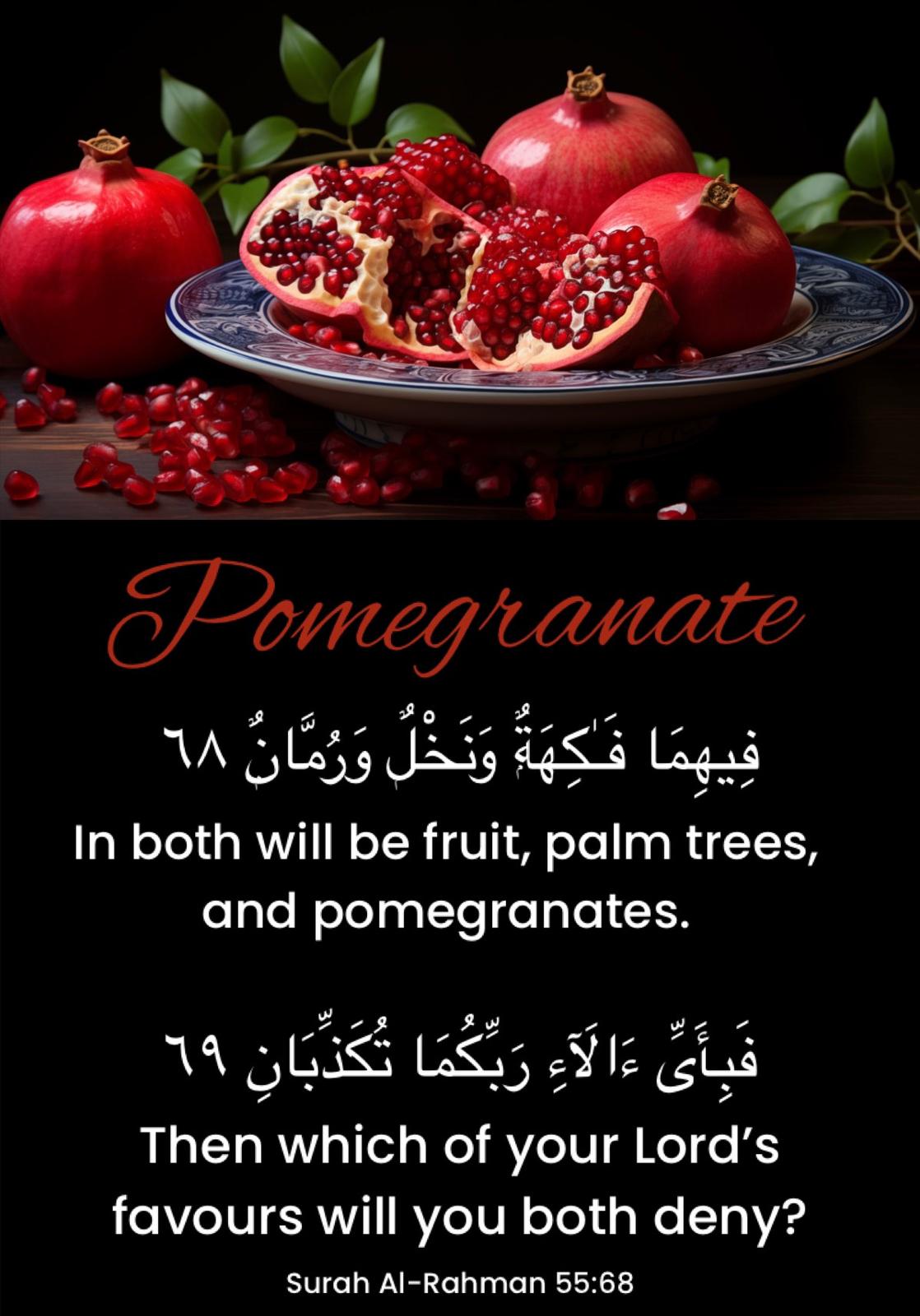
The pomegranate, ar-Rummān in Arabic, is mentioned thrice in the Qur’an and one of the fruits found in paradise. Pomegranate is from amongst the fruits that were honoured with a place on the dining mat of Allah’s Messenger Prophet Muhammad SAW PBUH. The pomegranate tree is native from Iran to the Himalayas in northern India and has been cultivated since ancient times throughout the Mediterranean region of Asia, Africa and Europe. The fruit was used in many ways as it is today and was featured in Egyptian mythology and art. It was carried by desert caravans for the sake of its thirst-quenching juice. It travelled to central and southern India from Iran about the first century A.D. and was reported growing in Indonesia in 1416. It has been widely cultivated throughout India and drier parts of southeast Asia, Malaya, the East Indies and tropical Africa. The most important growing regions are Egypt, China, Afghanistan, Pakistan, Bangladesh, Iran, Iraq, India, Burma and Saudi Arabia. In its taste and characteristics Pomegranates come in a variety of flavours: sour, sweet, or a combination of the two. Sweet pomegranates offer a refreshing taste, while the sour ones tend to be drier in texture. The pomegranate is found in either a small, round shrub or tree form. It is usually between three to six meters in height, but can reach up to nine meters. It is deciduous, meaning that it sheds its leaves, but in certain regions of the world, the leaves remain on the tree (evergreen). The production capacity of the tree declines after approximately 15 years. However, it is a long-living species and some specimens have lived as long as 200 years.
HEALTH BENEFITS
Pomegranate juice is delicious, agreeable upon the palate, and invigorates the body. Tafsīr Kabīr, Al-Anʿām, under verse no: 99, vol. 5, p. 86. Additionally, pomegranates regulate blood pressure, enhance memory, fortify bones, mitigate dehydration, support digestion, boost the immune system, prevent hair loss, promote hair growth and quality, and enhance visual acuity. It even helps with anaemia and a lack of blood in the body. By using it for 21 consecutive days, the paleness of one’s face can be removed. It is easily absorbed into the body and helps strengthen it.
A half-cup of pomegranate contains 16 grams of carbohydrates, 1.5 grams of protein, and 1 gram of fat. These nutrients provide about 72 calories per half-cup serving. Although they are high in sugar, they also contain a good amount of fiber per serving, about 3.5 grams. To an extent, the fiber content balances the effects of sugar in the body.
1. Rich in Antioxidants Pomegranates are packed with powerful antioxidants, particularly polyphenols like tannins, flavonoids, and anthocyanins. These compounds help protect the body from free radical damage, which is linked to aging and various diseases, including heart disease and cancer. In Islamic tradition, the concept of purity and health is often connected with foods that provide protection from harm, and pomegranates fit this description perfectly.
2. Heart Health Pomegranates are known to be heart-healthy, helping to reduce blood pressure, lower bad cholesterol (LDL), and improve blood circulation. The fruit’s high antioxidant content reduces inflammation in the arteries, preventing heart disease and atherosclerosis. The Prophet Muhammad (PBUH) emphasized the importance of maintaining good health, and consuming such beneficial fruits aligns with this guidance.
3. Anti-Inflammatory Properties Chronic inflammation is a major contributor to many diseases, including arthritis, diabetes, and heart disease. Pomegranate has potent anti-inflammatory effects, which can help reduce swelling and pain in conditions like rheumatoid arthritis. Its healing properties are seen as a divine blessing from paradise, purifying and restoring balance to the body.
4. Supports Digestive Health Pomegranates are rich in dietary fiber, which aids digestion by promoting regular bowel movements and preventing constipation. The fruit’s natural enzymes also support healthy gut bacteria and can help in the treatment of digestive issues like irritable bowel syndrome (IBS). In Islamic teachings, maintaining good digestive health is often linked to overall well-being, and pomegranate serves as a natural remedy.
5. Cancer-Fighting Properties Pomegranate has shown potential in preventing and inhibiting the growth of cancer cells, particularly in breast, prostate, and colon cancers. The antioxidants in pomegranate help prevent DNA damage, reduce oxidative stress, and slow down the growth of cancerous cells. Islamic medicine often emphasizes natural remedies, and the Qur’an’s references to pomegranate highlight its role in promoting health and preventing harm.
6. Boosts Immune System The high levels of vitamin C and other essential nutrients in pomegranates help strengthen the immune system. Regular consumption can increase the body’s ability to fight infections and prevent illness. In the Islamic tradition, maintaining a strong body and immune system is seen as essential for physical and spiritual health, and pomegranates are considered one of the natural ways to achieve this.
7. Promotes Skin Health Pomegranate’s antioxidant-rich composition can help protect the skin from premature aging by reducing the appearance of wrinkles, fine lines, and sun damage. It also promotes the healing of wounds and skin irritations. Pomegranate oil is commonly used in skincare products due to its ability to regenerate skin cells and repair damage, supporting the Islamic view that consuming healthy foods contributes to overall well-being and beauty.
8. Helps Regulate Blood Sugar Pomegranate may help regulate blood sugar levels and improve insulin sensitivity, making it beneficial for people with type 2 diabetes. Research suggests that pomegranate juice can lower blood sugar levels and improve metabolic health. In the Islamic tradition, maintaining a balanced diet and healthy body is important, and consuming foods like pomegranate can assist in managing conditions such as diabetes.
SPIRITUAL BENEFITS
Pomegranate believed to improve spiritual healing, cleanse the heart, and offer protection against black magic in Islamic tradition:
1. Purification of the Heart Pomegranate is often cited as a means to purify the heart and remove spiritual impurities. In one hadith, the Prophet Muhammad SAW is reported to have said:
“Eat pomegranates, for they cleanse the heart and remove evil from the body.”
— Reported by Al-Daraqutni
This statement suggests that consuming pomegranate has a purifying effect on the heart, removing negative thoughts, sinful inclinations, and harmful desires. It is believed that by eating pomegranate, a person can attain a higher spiritual state and develop a cleaner heart, free from the influence of envy, anger, or hatred.
2. Protection from Evil Pomegranate is considered a fruit that provides protection from the evil one (Shaytan). The Prophet Muhammad SAW is reported to have mentioned that pomegranate, like many blessed foods, shields the consumer from evil whispers and negative energies. It is seen as a divine remedy against harmful forces that attempt to lead one astray, including black magic (sihr) and evil eye. “The pomegranate is protected from the evil one (Shaytan), and when eaten, it removes evil from the body.” — Reported by Al-Tirmidhi and others.
3.Healing from Black Magic and Spirtual Harm In Islamic tradition, black magic (Sihr) and spiritual afflictions are believed to be able to harm a person’s well-being. Pomegranate is sometimes recommended as a spiritual remedy to cleanse the body and soul from such effects. It is believed that the fruit can help protect the individual from the effects of black magic and evil forces, as its blessings are said to ward off such negative influences.
4. Increases Barakah (Divine Blessings) Pomegranate is thought to bring barakah (divine blessings) to a person’s life. By consuming it regularly, one may experience an increase in spiritual and material blessings. This includes peace of mind, prosperity, and the protection of one’s family and wealth. In the context of spiritual healing, pomegranate symbolizes abundance and is believed to bring Allah’s mercy and protection.
5.Enhances Spiritual Clarity and Focus Consuming pomegranate is thought to enhance spiritual clarity and mental focus, helping individuals stay spiritually aligned and focused on their prayers and worship. The fruit’s purity and health benefits are thought to reflect the clarity of a clean heart and mind, making it easier for individuals to connect with Allah in prayer and contemplation.
6.Healing from Emotional Wounds Just as pomegranate is physically nourishing, it is believed to have healing properties for emotional wounds, such as grief, sadness, or depression. The fruit’s connection to paradise gives it the power to uplift the spirit and restore inner peace. Consuming pomegranate is often thought to aid in healing from spiritual pain and fostering mental tranquility, helping individuals to overcome feelings of hopelessness or distress.
7. Cleansing the Soul from Sinful Habits Pomegranate is seen as a spiritual cleanser, helping to purify the soul from the negative effects of sinful behavior. Its consumption is viewed as a means to rid oneself of harmful traits, such as pride, envy, and greed, while promoting positive qualities like humility, patience, and generosity. By eating this blessed fruit, a person can spiritually cleanse themselves and strive toward self-improvement.
Quran & Sunnah Hadiths
The pomegranate is frequently mentioned in the Qur’an as a fruit of paradise:
“And in both [gardens] there will be fruits, dates, and pomegranates.” — Surah Ar-Rahman (55:68)
“It is He Who caused gardens to be produced; some spread out on the ground and some not spread out, and the date palm and crops in which are various kinds of foods, and the olive and the pomegranate; similar in some respects and unlike in others” Al-Quran, 6:141, Translation from Kanz al-Īmān For this verse, there are multiple explanations for what “similar in some respects. One of these is the similarity between the leaves of both the pomegranate and olive tree, despite their fruit differing in appearance and taste. Tafsīr Khāzin, Al-Anʿām, under verse no: 141, vol. 2, p. 61
Ibn Katheer (may Allah have mercy on him) said: The date-palm and pomegranate are singled out for mention because of their superiority over other fruits. Tafseer Ibn Katheer (7/507)
The fourth Caliph of Islam, Sayyiduna ʿAlī b. Abī Ṭālib رَضِىَ الـلّٰـهُ عَـنْهُ said, “Eat pomegranates with its inner membrane, for this cleanses the stomach.” Musnad Ahmad: 23237
When eating pomegranate, the Companion Sayyiduna ʿAbdullah b. ʿAbbās رَضِىَ الـلّٰـهُ عَـنْهُما would eat every single aril inside. When asked why, he explained, “I have learnt there is not a single pomegranate tree on Earth except it contains an aril from a pomegranate of Paradise, which is placed inside it to make it bear fruit. It is possible this is that very aril.” Ḥilyat al-Awliyāˈ, vol. 1, p. 398, raqm 1139
The Tābiʿī, Muhammad b. Sīrīn رَحْمَةُ الـلّٰـهِ عَلَيْه said, “˹In terms of rank˺, the pomegranate is amongst the fruits as Jibrīl عَـلَيْـهِ الـسَّـلَام is amongst the angels.”
Ḥilyat al-Awliyāˈ, vol. 2, p. 311, raqm 2360
Sulayman b. Muhammad, who performed the call to prayer at the mosque of the Messenger of Allah, blessings of Allah on him and his family, narrated from ‘Uthman b. ‘Isa al-Kilabi from Isma’il b. Jabir from Ja’far al-Sadiq, (PBUH), from his pure forefathers from Amir al-Mu’minin, (PBUH), who said: “Eat the pomegranate with its pulp, for it is an abdomenic (dibagh). Every grain of it which settles in the abdomen is life for the heart (al-qalb) and illumination for the soul, and the temptations of Satan are quelled for forty mornings. The pomegranate is among the fruits of Paradise. Allah, the Mighty and Exalted, has said: Therein fruits, and palm trees, and pomegranates (55:68).
TIPS
The leader of Ahl al-Sunnah دَامَـتْ بَـرَكَـاتُـهُـمُ الْـعَـالِـيَـهْ also discusses pomegranates in his book Gharēlū Ilāj (Domestic Cures). He writes: Blending dried pomegranate skin into fine pieces (around 6 grams worth) and ingesting this with fresh water helps treat bleeding piles. Sucking the pomegranate skin assists in remedying a cough.
One can take pomegranate flowers, dry them in the shade, grind them into fine pieces and fill a bottle/container with them. Rub this onto the teeth morning and evening. This will stop bleeding gums and stop teeth from moving in the gums. Eat ripe pomegranate heartily with salt and black pepper. This will remove stomach pain.
RECIEPE
POMOGRANATE MOLASSES
This recipe yields about 1 1/4 cups of pomegranate molasses. PREP TIME: 25 mins. COOK TIME: 1 HR approx.
Ingredients
- 4 cups pomegranate juice
- 1/2 cup + 2 tablespoons sugar
- 1/4 cup lemon juice, about one large lemon
HOW TO GET POMOGRANATE JUICE
–Dig into those ruby globes and separate the arils. Find the crown of the pomegranate (the part that’s sticking out). (Did you know that the crown is actually the bottom of the pomegranate?) Holding the paring knife at a diagonal, start cutting underneath the crown. Make a full circle around the crown and remove it.
–Pull apart the pomegranate into different sections. Remove the arils by prying them loose from the rind. To prevent pomegranate juice from splattering everywhere (because it will), loosen the arils inside a large bowl filled with water.
-When the seeds have sunken to the bottom of the bowl and the loose membrane will float on the top. Remove any stray pieces of membrane, and drain all the water. Pour seeds into a high-speed blender or food processor, and pulse or gently blend until all the seeds have been crushed. Strain the juice through a fine-mesh strainer. Use a spatula to press down on the purée so that you can squeeze out as much juice as possible.
Instructions for molasses
- Boil the pomegranate juice, sugar, and lemon juice in a saucepan over medium-high heat. When the juice boils, reduce the heat to a medium-low. You should see the liquid boiling very gently in the middle.
- Let the mixture simmer for about an hour, uncovered. Stir occasionally to make sure that the sugars don’t stick to the bottom of the saucepan.
- After 45 minutes of simmering, you’ll notice that a lot of liquid has burned off. Reduce the heat very slightly and let it simmer for another 15 minutes or so. Take a spoon and dip it into the molasses. If it coats the spoon, the molasses is done cooking.
- Turn off the heat and let it cool for 30 minutes before pouring it into a jar. The mixture will still be runny, but don’t worry. The molasses thickens as it cools.
- This recipe should yield about 1 cup and 2 tablespoons of pomegranate molasses. Store the molasses in the refrigerator for up to 6 months
How to tell when the molasses is done: After an hour, you’ll notice that the bubbles will start to look thicker at more viscous. That’s a good sign. You want the molasses to be able to coat the back of a spoon. I also like to pour the molasses into a glass measuring jar to see how much liquids I have. Once I’ve boiled everything down to a little over a cup, I’ll stop. This recipe should yield 1 cup and 2 tablespoons of molasses.
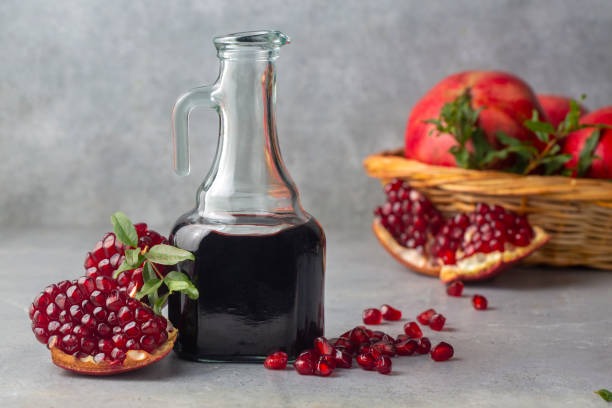
© 2024 Alhijama. All Rights Reserved.
